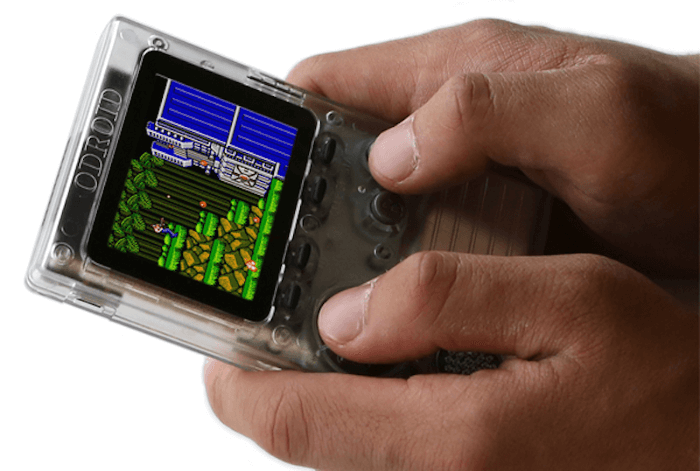ODROID-GO
Overview
ODROID-GO Game Kit is a “Do it yourself” (“DIY”) portable game console by HardKernel. It features a custom ESP32-WROVER with 16 MB flash and it operates from 80 MHz - 240 MHz 1.
The features include the following:
Dual core Xtensa microprocessor (LX6), running at 80 - 240MHz
4 MB of PSRAM
802.11b/g/n/e/i
Bluetooth v4.2 BR/EDR and BLE
2.4 inch 320x240 TFT LCD
Speaker
Micro SD card slot
Micro USB port (battery charging and USB_UART data communication
Input Buttons (Menu, Volume, Select, Start, A, B, Direction Pad)
Expansion port (I2C, GPIO, SPI)
Cryptographic hardware acceleration (RNG, ECC, RSA, SHA-2, AES)

Fig. 203 ODROID-Go Game Kit
External Connector
PIN # |
Signal Name |
ESP32-WROVER Functions |
|---|---|---|
1 |
GND |
GND |
2 |
VSPI.SCK (IO18) |
GPIO18, VSPICLK |
3 |
IO12 |
GPIO12 |
4 |
IO15 |
GPIO15, ADC2_CH3 |
5 |
IO4 |
GPIO4, ADC2_CH0 |
6 |
P3V3 |
3.3 V |
7 |
VSPI.MISO (IO19) |
GPIO19, VSPIQ |
8 |
VSPI.MOSI (IO23) |
GPIO23, VSPID |
9 |
N.C |
N/A |
10 |
VBUS |
USB VBUS (5V) |
Supported Features
The Zephyr odroid_go board configuration supports the following hardware features:
Interface |
Controller |
Driver/Component |
|---|---|---|
UART |
on-chip |
serial port |
GPIO |
on-chip |
gpio |
PINMUX |
on-chip |
pinmux |
I2C |
on-chip |
i2c |
SPI |
on-chip |
spi |
System requirements
Prerequisites
Espressif HAL requires binary blobs in order work. The west extension below performs the required syncronization to clone, checkout and pull the submodules:
west espressif update
Note
It is recommended running the command above after west update.
Building & Flashing
Build and flash applications as usual (see Building an Application and Run an Application for more details).
# From the root of the zephyr repository
west build -b odroid_go samples/hello_world
The usual flash target will work with the odroid_go board
configuration. Here is an example for the Hello World
application.
# From the root of the zephyr repository
west build -b odroid_go samples/hello_world
west flash
Open the serial monitor using the following command:
west espressif monitor
After the board has automatically reset and booted, you should see the following message in the monitor:
***** Booting Zephyr OS vx.x.x-xxx-gxxxxxxxxxxxx *****
Hello World! odroid_go
Debugging
As with much custom hardware, the ESP32 modules require patches to OpenOCD that are not upstreamed. Espressif maintains their own fork of the project. The custom OpenOCD can be obtained by running the following extension:
west espressif install
Note
By default, the OpenOCD will be downloaded and installed under $HOME/.espressif/tools/zephyr directory (%USERPROFILE%/.espressif/tools/zephyr on Windows).
The Zephyr SDK uses a bundled version of OpenOCD by default. You can overwrite that behavior by adding the
-DOPENOCD=<path/to/bin/openocd> -DOPENOCD_DEFAULT_PATH=<path/to/openocd/share/openocd/scripts>
parameter when building.
Here is an example for building the Hello World application.
# From the root of the zephyr repository
west build -b odroid_go samples/hello_world -- -DOPENOCD=<path/to/bin/openocd> -DOPENOCD_DEFAULT_PATH=<path/to/openocd/share/openocd/scripts>
west flash
You can debug an application in the usual way. Here is an example for the Hello World application.
# From the root of the zephyr repository
west build -b odroid_go samples/hello_world
west debug
